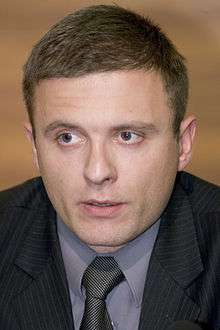Mateusz Piskorski
| Mateusz Piskorski | |
|---|---|
 | |
| member of Sejm 2005-2007 | |
|
In office September 25, 2005 – November 4, 2007 | |
| Personal details | |
| Born |
May 18, 1977 Szczecin, Poland |
| Nationality | Poland |
| Political party | Zmiana |
Mateusz Piskorski is a Polish political activist. He was born 18 May 1977 in Szczecin, Poland.
Political activity
As a student he joined the Polish People's Party. He was also active in various societies promoting the idea of Pan-Slavism and Slavic nationalism.[1] He published pamphlets which have been described by Rafał Pankowski (a left wing activist) as "hardline neo-Nazi".[2] He himself described his mindset as "traditionalist nationalist".[1] In 2000 he quit the People's Party and in 2002 joined the Self-Defence of the Republic of Poland party to become the assistant to Member of Parliament Jan Łączny. He brought with him a cohort of neo-nazi skinheads into the party.[2] A 2001 graduate of the humanist faculty of the Szczecin University, he remained at his alma mater as a doctoral student. He quit this job in 2005 to devote himself to politics. In 2005 he also became one of principal members of Andrzej Lepper's electoral committee during the Polish 2005 presidential election.
In Polish 2005 parliamentary election he successfully ran for the Sejm from the Szczecin constituency. The following year he also ran for president of Szczecin in the 2006 local elections, but withdrew before the elections and supported a Law and Justice candidate instead.[3] He failed to defend his seat in the Polish 2007 parliamentary election and failed to return to the parliament in the 2011 parliamentary election (this time running as a candidate of Polish Labour Party (Sierpień 80)).[4] In 2007 he co-founded the European Centre for Geopolitical Analysis, a Szczecin-based think-tank on international relations and geopolitics,[5] Piskorski served as an observer for the 2014 Crimean referendum[6] for a organization which according to Newsweek is Russian-funded.[7] In 2015 he co-funded a new party called Zmiana in Poland, aiming at spreading information regarding War in Donbass and invited representatives of Novorussia to inform the Polish public about their views about the war and represent equally the other side of the conflict in Polish public debates.[8][9][10][11]
See also
References
Citations
- 1 2 Gk, p. 1.
- 1 2
- ↑ zel, p. 1.
- ↑ Państwowa Komisja Wyborcza, p. 1.
- ↑ Geopolityka.org, Eksperci ECAG.
- ↑
- ↑
- ↑ http://www.polskatimes.pl/artykul/3750615,zmiana-nowa-partia-ludzi-andrzeja-leppera-zapraszaja-do-polski-przedstawicieli-noworosji,id,t.html?cookie=1#.VOHQVeed1rw.twitter
- ↑ http://mateuszpiskorski.blog.onet.pl/
- ↑ http://www.thenews.pl/1/10/Artykul/197948,Ukrainian-separatists-blocked-from-entering-Poland/
- ↑ http://sputniknews.com/europe/20150225/1018756928.html/
Bibliography
- (Polish) Gk; Polish Press Agency (corporate author); Rzeczpospolita (corporate author) (06-10-2002). "Jesienny zaciąg Leppera" [Lepper's autumn levy]. Newsweek Polska (06-10-2002). ISSN 1642-5685. Retrieved 18-03-2014. Check date values in:
|access-date=, |date=(help) - (Polish) ECAG (corporate author). "Eksperci ECAG". Geopolityka.org. Retrieved 2014-03-18.
- (Polish) zel; Polish Press Agency (corporate author) (10-11-2006). "Kandydat Samoobrony rezygnuje ze startu w wyborach na rzecz kandydatki PiS". wiadomosci.wp.pl (2006-11-10). Retrieved 2014-03-18. Check date values in:
|date=(help) - (Polish) Państwowa Komisja Wyborcza (corporate author) (2011). "Piskorski Mateusz Andrzej". Wybory 2011. Retrieved 2014-03-14.
External links
- Mateusz Piskorski - parliamentary page - includes declarations of interest, voting record, and transcripts of speeches.
|